A court in Egypt has allowed Cairo University to ban female professors from wearing the Islamic niqab in the classrooms.
The Administrative Court ruled on the lawsuit presented by Ahmed Mahran, the head of the Cairo Center for Political and Legal Studies, against university president Dr. Gaber Nassar. The lawsuit included “77 women faculty members, including some who do not wear the niqab but joined the cause in solidarity with those the ban would harm.”
Nassar said only 10 women on the 22,000-strong staff wear the niqab.
The court agreed the decision does not violate the law, but it in fact helps public interest since banning the niqab “protects the rights of students” while also prevents “entry of extremists and outsiders of the University.” He also said the ban will “ease communication with students.”
The lawyers fired back with more lawsuits to overturn the decision. Despite the ruling, they insist the ban violates the Constitution, which states that people earn or keep public jobs “on the basis of merit” and may only be dismissed by points “specified by law.” They claim these professors must be allowed to perform their jobs “without any discrimination because of religion, or creed, or sex, origin, race, color, language, or disability, or social status, or political affiliation.”
Nassar presented the ban to the university deans last September.
“It is not allowed for the academic staff and their assistants in all faculties and institutions to teach in theoretical or practical classes or to attend laboratories or practical trainings while wearing the niqab,” stated the president.
The ban only forbids the naqib in the classroom, but the professors can wear them around campus.
The majority of Egyptian women do not wear the niqab, which is different from the hijab. The niqab covers the entire head except for a slit for the eyes. The burqa is a cloth that covers the body from the shoulders to the floor.
France made waves in 2009 when then-President Nicolas Sarzoky claimed that the country did not welcome religious veils. The French Senate passed the ban 246 to 1. Sarzoky embraced the law, stating it would “protect women from being forced to cover their faces and to uphold France’s secular values.”
A group of plaintiffs took the country to court, but the European Court of Human Rights agreed the French government could ban the full-face veil. One Muslim woman said the law “violated her freedom of religion and expression.” But the court ruled the law “was not expressly based on the religious connotation of the clothing in question but solely on the fact that it concealed the face.”
In December, officials in Lombardy, Italy’s wealthiest region, banned the burqa and niqab from hospitals and government buildings.

COMMENTS
Please let us know if you're having issues with commenting.